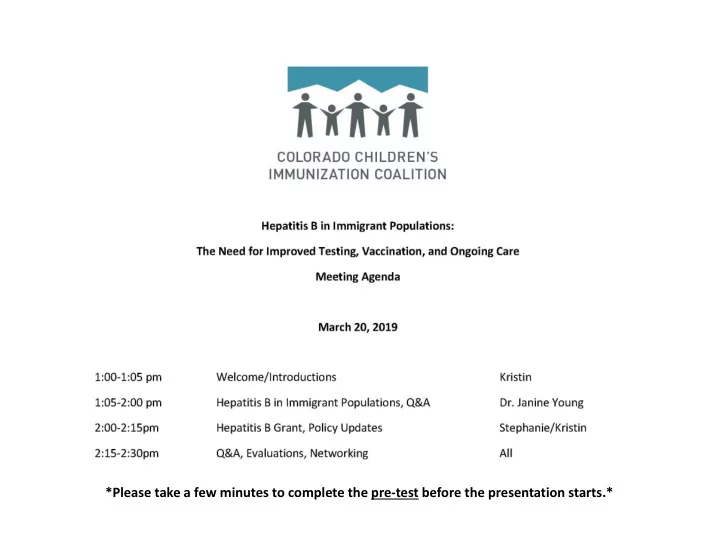

*Please take a few minutes to complete the pre‐test before the presentation starts.*
Hepatitis B in Immigrants The need for improved testing, vaccination and linkage to ongoing care Janine Young, MD, FAAP March 20, 2019
• No financial or other relevant disclosures
Goals • Case examples • Review US immigration data • Provide overview of hepatitis B epidemiology in immigrant populations • Summarize approach to hepatitis B refugee screening and vaccination overseas and at US arrival • Review international approaches to decreasing hepatitis B infections overseas • Discuss strategies to improve hepatitis B screening, vaccination and linkage to ongoing care in immigrant populations
Burmese women receiving prenatal care at local hospital. Prenatal lab testing done and she has Hep B, viral load not high enough for anti‐virals during pregnancy. Infant is born, receives HBIG and 1 st hep B vaccine at dol 1. Infant discharged and receives timely hep B vaccines and is found to be uninfected and protected against hep B at 9 month WCC. Of note, mom has 2 other children Questions : How is the mother managed after birth of the baby? Other children? What standards are in place in CO to address this? How often do women have prenatal lab screenings done overseas? Photo credit: Cynthia Maung, MD, Mae Tao Clinic, Mae Sot, Thailand
Somali refugee woman tested in X State at US arrival for Hep B, diagnosed with HBV infection in 2007 and lost to follow‐up since initial screening 5 yo daughter and other sibs not tested at arrival. Unclear if husband was tested and records cannot be tracked down. Her daughter now presents at age 17 yo and prior screening labs reviewed. No results for Hep B can be found. She is now tested and is Hep B s Ag positive. Mom and daughter re‐linked to care, afraid to have liver biopsy Photo credit: Moved to MN WHO Hepatitis 2017
US Dept of State, Refugee Admissions by Region, 1975‐ 12/31/2018
Colorado Arrival Data, FY 2017, 2018 • FY 2018: FY 2017: – Primary arrivals: 839 Primary arrivals: 1703 – Secondary arrivals: 254 Secondary arrivals: 364 • Primary arrivals: – Afghanistan 239 Afghanistan 333 – DRC 179 DRC 169 – Burma 113 Burma 174 – Eritrea 71 Eritrea 73 – Ethiopia 53 Ethiopia 34 – Bhutan 29 Bhutan 78 – Russia 19 Russia 8 – Somalia 10 Somalia 224 – Syria 3 Syria 119 – El Salvador 5 El Salvador 18 – Guatemala 2 Guatemala 2 – Honduras 0 Honduras 0 – Sudan 6 Sudan 3 – Iraq 15 Iraq 215 CRSP, https://www.colorado.gov/pacific/cdhs/about‐ refugees#About
Photo credit: J Young
Burmese Refugees, 2008‐2014 (N=109,033) • Majority are from minority ethnic groups – Karen, Chin, Kachin, Mon, Rakhine, Shan, Wa Source: CDC Refugee Health Profiles
https://www.who.int/hepatitis/news‐events/global‐hepatitis‐ report2017‐infographic/en/
HBV prevalence by region, 2015 https://apps.who.int/iris/bitstream/handle/10665/255016/97892 41565455‐eng.pdf?sequence=1
Hepatitis B Background Data • ~ 30% people world‐wide have evidence of current or past infection • ~65 million women of childbearing age are infected with HBV • 2015, ~884,400 deaths from HBV, cirrhosis>HCC The Lancet, HBV Infection ,Trepo C et al, 2014; WHO Hepatitis Report, 2017
Distribution of Hepatitis B Genotypes The Lancet, 2014
The Mae La Refugee Camp. Photo credit, Karen News
Definitions • Hepatitis B : – Double‐stranded DNA virus transmitted either horizontally (via blood, unprotected sex) or vertically • Hepatitis B Infection : o +HBsAg • Chronic Hepatitis B Infection : o +HBsAg >6 months • Vaccine‐derived protection from Hep B : o ‐HBsAg, ‐HBcAb, +HBsAb • Cleared Hep B infection o ‐HBsAg, +HBcAb, +HBsAb
IOM Mae La Refugee Camp Health data, refugees pending resettlement January‐July 2018 • 7/153 (4.38%) Hep B s Ag positive • UPT positive: 22/442 (4.74%) positive • HIV 0/123 positive • Hep C 0/9 positive
Prevalence of Hep B in Refugee Children, by age and country of origin, 2006‐2012—CO, PA, WA, MN Condition Bhutan Burma via Burma via DRC Ethiopia Iraq Somalia Thailand Malaysia Yun K, et al. AJPH, 2016
Recommend
More recommend